

The following digitized images are of newspaper articles that were published during the times of the slave uprising in Jamaica. As would be expected, only the perspectives of the landowners, the Jamaican and British government were reported. Unfortunately, we have been unable to find any reporting from the period that gave voice to those who rose up. It is unlikely such documents exist. This article is an account by the Governor of Jamaica about the uprising and the actions taken in response. It is a vivid and engaging glimpse into what was happening at the time. A transciption of the text is provided with each image.

COLONIAL DEPARTMENT.
Downing-street, Feb. 22, 1832.
The following communication from the Governor of Jamaica was received at this office on Sunday last :
King's House, Jamaica, Jan. 6, 1832.
My Lord--I have a painful duty to discharge, in detailing to your lordship the substance of accounts I have received, by which you will learn that an extensive and destructive insurrection amongst the slaves, in the western district of this island, has followed a season of unusual sickness and distress, and that I have felt myself compelled to resort to the most active measures, even that of proclaiming martial law, to arrest the progress of so great a danger.
It was not until Thursday, the 22d ult. that I received any accounts to excite alarm. The apprehensions which appeared to disturb the public mind during the summer had nearly subsided. The planters complained of poverty and distress -- the delegates sent forth an ambiguous, declaration, deprecating (as they expressed themselves) "the insidious attempts to undermine and render valueless what little remains of their property," but the brink of danger on which they stood formed no part of their deliberations.
On the 22d December I received a despatch from Col. Lawson, a magistrate, and commanding the St. James's regt. of militia, dated the 20th, stating that on Friday preceding he met the overseer of Salt Spring estate, who informed him that on the previous day the negroes had behaved with great insolence to Mr. Grignon, the attorney or chief manager of the estate; that two constables, who had been sent to convey the ringleaders to Montego Bay, had been assaulted and deprived of pistols, with which they were armed, as well as their mules, and that the negroes had expressed their determination not to work after New Year's-day. Mr. Grignon having repaired to Montego Bay, a special session of magistrates was assembled, when he and other persons employed on the estate gave information of the circumstances which had occurred, and of the riotous and disorderly state of the slaves; in consequence of which an order was issued by the magistrates to Major Coates, as the nearest held officer of militia, to send a detachment of the Saint James's regiment to Salt Spring estate, for the purpose of restoring order. Major Coates immediately communicated the directions he had received to Colonel Lawson, commanding the Saint James's regiment, and who, anxious to avoid the necessity of having recourse to the militia, and being for many years well known to the negroes of the estate, delayed the detachment from marching, and accompanied by Mr. Tharp, a neighbouring proprietor, proceeded to the estate, in the hope, by his influence, to prevail on the negroes to return to their duty. He found the negroes assembled in groups about the buildings on the estate, and was informed that the senior bookkeeper had suffered ill-treatment, and that his life had been threatened. He endeavoured to expostulate with the negroes, telling them he came as their friend, and asked them to listen to him they would not, however, suffer him to approach them, and walked off; and finding all his endeavours to restore order ineffectual, he left them. Soon after, a party of fifty men of the militia arrived, when almost every negro on the estate disappeared. The next day they began to return, and when Colonel Lawson wrote his despatch, the principal offenders only, amounting to six persons, were absent. This conduct of the negroes on Salt Spring estate, and information which the magistrates had received, that the negroes on other estates would not return to work after New Year's Day, induced the magistrates assembled at Montego Bay to forward a requisition to Major Pennefather, commanding the 22d regiment, at Falmouth, to order a detachment to march to that town, which Major Pennefather immediately complied with. On the following day I received an application from certain magistrates and inhabitants of the parish of Portland, desiring that a vessel of war might be ordered to Port Antonio, on account of some unpleasant rumours which had reached them of discontent amongst the slaves in that quarter.
Being in Kingston when these accounts arrived, I immediately communicated the information I had received to Sir Willoughby Cotton. I applied to Commodore Farquhar for a ship of war to proceed to the port of Port Antonio, and, as a precautionary measure, I also recommended that ships of war should be despatched to Montego Bay and Black River, which Commodore Farquhar, with his usual promptitude and attention, immediately complied with. I directed circulars to be addressed to custodes of parishes, inclosing the King's proclamation, and also letters to be written to the Major-Generals of the militia, copies of which (Nos. 1 and 2) I inclose.
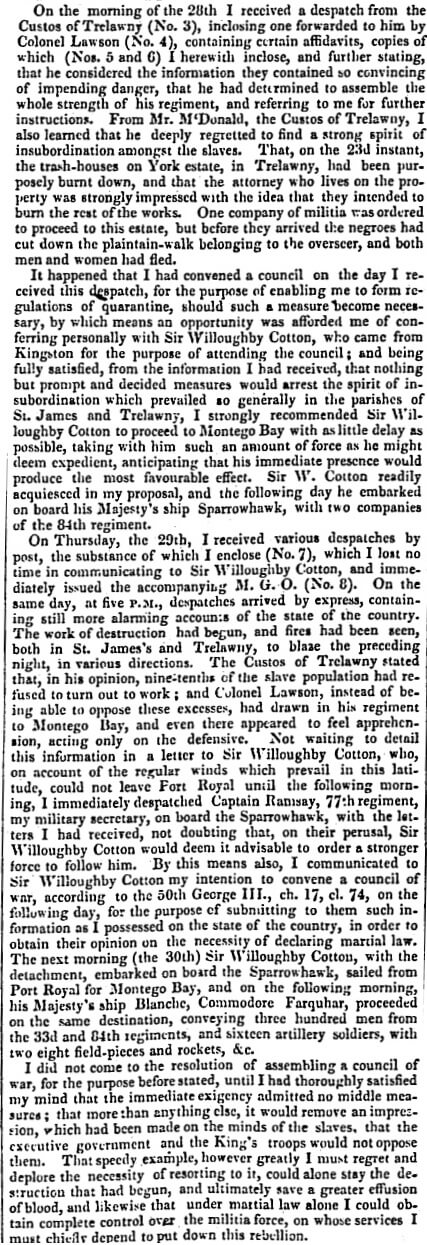
On the morning of the 28th I received a despatch from the Custos of Trelawny (No. 3), inclosing one forwarded to him by Colonel Lawson (No. 4), containing certain affidavits, copies of which (Nos. 5 and 6) I herewith inclose, and further stating, that he considered the information they contained so convincing of impending danger, that he had determined to assemble the whole strength of his regiment, and referring to me for further instructions. From Mr. McDonald, the Custos of Trelawny, I also learned that he deeply regretted to find a strong spirit of insubordination amongst the slaves. That, on the 23d instant, the trash-houses on York estate, in Trelawny, had been purposely burnt down, and that the attorney who lives on the property was strongly impressed with the idea that they intended to burn the rest of the works. One company of militia was ordered to proceed to this estate, but before they arrived the negroes had cut down the plaintain-walk belonging to the overseer, and both men and women had fled.
It happened that I had convened a council on the day I received this despatch, for the purpose of enabling me to form regulations of quarantine, should such a measure become necessary, by which means an opportunity was afforded me of conferring personally with Sir Willoughby Cotton, who came from Kingston for the purpose of attending the council; and being fully satisfied, from the information I had received, that nothing but prompt and decided measures would arrest the spirit of insubordination which prevailed so genérally in the parishes of St. James and Trelawny, I strongly recommended Sir Wil loughby Cotton to proceed to Montego Bay with as little delay as possible, taking with him such an amount of force as he might deem expedient, anticipating that his immediate presence would produce the most favourable effect. Sir W. Cotton readily acquiesced in my proposal, and the following day he embarked on board his Majesty's ship Sparrowhawk, with two companies of the 84th regiment.
On Thursday, the 29th, I received various despatches by post, the substance of which I enclose (No. 7), which I lost no time in communicating to Sir Willoughby Cotton, and immediately issued the accompanying M. G. O. (No. 8). On the same day, at five P.M., despatches arrived by express, containing still more alarming accounts of the state of the country. The work of destruction had begun, and fires had been seen, both in St. James's and Trelawny, to blaze the preceding night, in various directions. The Custos of Trelawny stated that, in his opinion, nine-tenths of the slave population had refused to turn out to work; and Colonel Lawson, instead of being able to oppose these excesses, had drawn in his regiment to Montego Bay, and even there appeared to feel apprehension, acting only on the defensive. Not waiting to detail this information in a letter to Sir Willoughby Cotton, who, on account of the regular winds which prevail in this latitude, could not leave Port Royal until the following morning, I immediately despatched Captain Ramsay, 77th regiment, my military secretary, on board the Sparrowhawk, with the letters I had received, not doubting that, on their perusal, Sir Willoughby Cotton would deem it advisable to order a stronger force to follow him. By this means also, I communicated to Sir Willoughby Cotton my intention to convene a council of war, according to the 50th George III., ch. 17, cl. 74, on the following day, for the purpose of submitting to them such in formation as I possessed on the state of the country, in order to obtain their opinion on the necessity of declaring martial law. The next morning (the 30th) Sir Willoughby Cotton, with the detachment, embarked on board the Sparrowhawk, sailed from Port Royal for Montego Bay, and on the following morning, his Majesty's ship Blanche, Commodore Farquhar, proceeded on the same destination, conveying three hundred men from the 33d and 84th regiments, and sixteen artillery soldiers, with two eight field-pieces and rockets, &c.
I did not come to the resolution of assembling a council of war, for the purpose before stated, until I had thoroughly satisfied my mind that the immediate exigency admitted no middle measures; that more than anything else, it would remove an impression, which had been made on the minds of the slaves, that the executive government and the King's troops would not oppose them. That speedy example, however greatly I must regret and deplore the necessity of resorting to it, could alone stay the destruction that had begun, and ultimately save a greater effusion of blood, and likewise that under martial law alone I could obtain complete control over the militia force, on whose services I must chiefly depend to put down this rebellion.
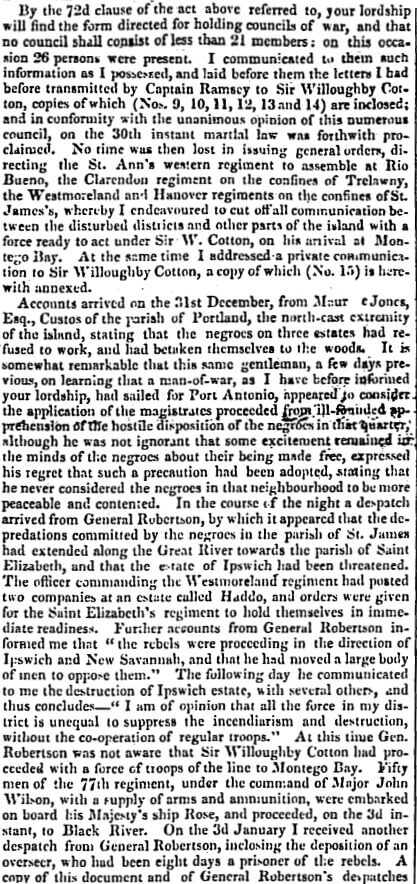
By the 72d clause of the act above referred to, your lordship will find the form directed for holding councils of war, and that no council shall consist of less than 21 members: on this occasion 26 persons were present. I communicated to them such information as I possessed, and laid before them the letters I had before transmitted by Captain Ramsey to Sir Willoughby Cot ton, copies of which (Nos. 9, 10, 11, 12, 13 and 14) are inclosed; and in conformity with the unanimous opinion of this numerous council, on the 30th instant martial law was forthwith proclaimed. No time was then lost in issuing general orders, directing the St. Ann's western regiment to assemble at Rio Bueno, the Clarendon regiment on the confines of Trelawny, the Westmoreland and Hanover regiments on the confines of St. James's, whereby I endeavoured to cut off all communication between the disturbed districts and other parts of the island with a force ready to act under Sir W. Cotton, on his anival at Montego Bay. At the same time I addressed a private communication to Sir Willoughby Cotton, a copy of which (No. 15) is herewith annexed.
Accounts arrived on the 31st December, from Maurice Jones, Esq., Custos of the parish of Portland, the north-east extremity of the island, stating that the negroes on three estates had refused to work, and had betaken themselves to the woods. It is somewhat remarkable that this same gentleman, a few days previous, on learning that a man-of-war, as I have before informed your lordship, had sailed for Port Antonio, appeared to consider the application of the magistrates proceeded from ill-founded apprehension of the hostile disposition of the negroes in that quarter, although he was not ignorant that some excitement remained in the minds of the negroes about their being made frec, expressed his regret that such a precaution had been adopted, stating that he never considered the negroes in that neighbourhood to be more peaceable and contented. In the course of the night a despatch arrived from General Robertson, by which it appeared that the depredations committed by the negroes in the parish of St. James had extended along the Great River towards the parish of Saint Elizabeth, and that the estate of Ipswich had been threatened. The officer commanding the Westmoreland regiment had posted two companies at an estate called Haddo, and orders were given for the Saint Elizabeth's regiment to hold themselves in immediate readiness. Further accounts from General Robertson informed me that "the rebels were proceeding in the direction of Ipswich and New Savannah, and that he had moved a large body of men to oppose them." The following day he communicated to me the destruction of Ipswich estate, with several others, and thus concludes -- "I am of opinion that all the force in my district is unequal to suppress the incendiarism and destruction, without the co-operation of regular troops." At this time Gen. Robertson was not aware that Sir Willoughby Cotton had proceeded with a force of troops of the line to Montego Bay. Fifty men of the 77th regiment, under the command of Major John Wilson, with a supply of arms and ammunition, were embarked on board his Majesty's ship Rose, and proceeded, on the 3d instant, to Black River. On the 3d January I received another despatch from General Robertson, inclosing the deposition of an overseer, who had been eight days a prisoner of the rebels. A copy of this document and of General Robertson's despatches
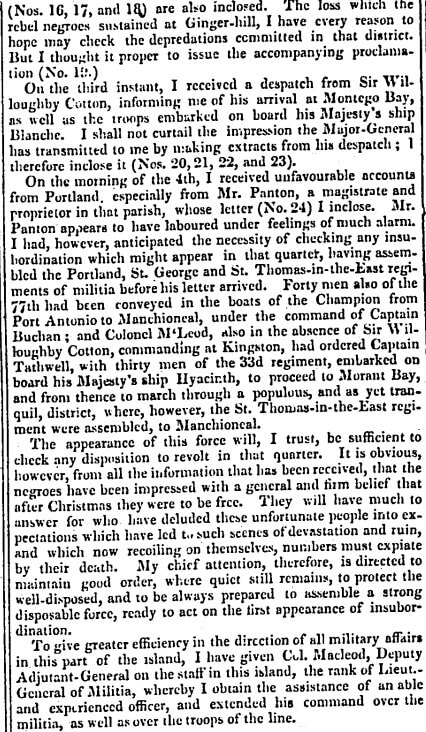
(Nos. 16, 17, and 18) are also inclosed. The loss which the rebel negroes sustained at Ginger-hill, I have every reason to hope may check the depredations committed in that district. But I thought it proper to issue the accompanying proclamation (No. 1)
On the third instant, I received a despatch from Sir Willoughby Cotton, informing me of his arrival at Montego Bay, as well as the troops embarked on board his Majesty's ship Blanche. I shall not curtail the impression the Major-General has transmitted to me by making extracts from his despatch; I therefore inclose it (Nos. 20, 21, 22, and 23).
On the morning of the 4th, I received unfavourable accounts from Portland, especially from Mr. Panton, a magistrate and proprietor in that parish, whose letter (No. 24) I inclose. Mr. Panton appears to have laboured under feelings of much alarm. I had, however, anticipated the necessity of checking any insubordination which might appear in that quarter, having assembled the Portland, St. George and St. Thomas-in-the-East regiments of militia before his letter arrived. Forty men also of the 77th had been conveyed in the boats of the Champion from Port Antonio to Manchioneal, under the command of Captain Buchan; and Colonel M'Leod, also in the absence of Sir Willoughby Cotton, commanding at Kingston, had ordered Captain Tathwell, with thirty men of the 33d regiment, embarked on board his Majesty's ship Hyacinth, to proceed to Morant Bay, and from thence to march through a populous, and as yet tranquil, district, where, however, the St. Thomas-in-the-East regiment were assembled, to Manchioncal.
The appearance of this force will, I trust, be sufficient to check any disposition to revolt in that quarter. It is obvious, however, from all the information that has been received, that the negroes have been impressed with a general and firm belief that after Christmas they were to be free. They will have much to answer for who have deluded these unfortunate people into expectations which have led to such scenes of devastation and ruin, and which now recoiling on themselves, numbers must expiate by their death. My chief attention, therefore, is directed to maintain good order, where quiet still remains, to protect the well-disposed, and to be always prepared to assemble a strong disposable force, ready to act on the first appearance of insubordination.
To give greater efficiency in the direction of all military affairs in this part of the island, I have given Col. Macleod, Deputy Adjutant-General on the staff in this island, the rank of Lieut. General of Militia, whereby I obtain the assistance of an able and experienced officer, and extended his command over the militia, as well as over the troops of the line.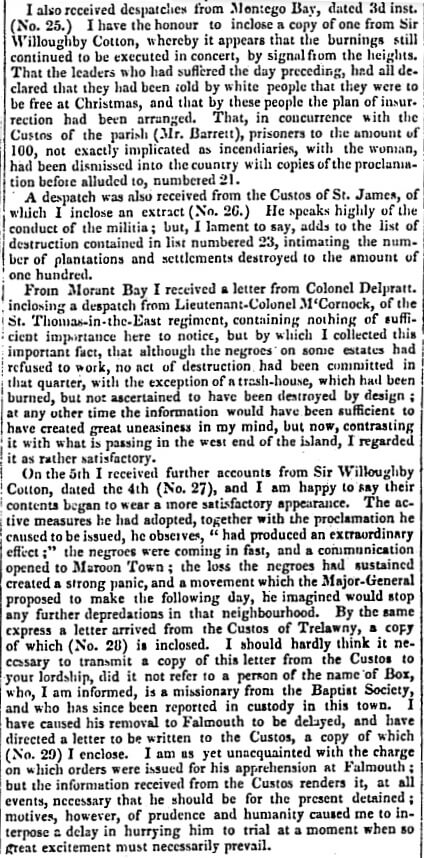
I also received despatches from Montego Bay, dated 3d inst. (No. 25.) I have the honour to inclose a copy of one from Sir Willoughby Cotton, whereby it appears that the burnings still continued to be executed in concert, by signal from the heights. That the leaders who had suffered the day preceding, had all declared that they had been told by white people that they were to be free at Christmas, and that by these people the plan of insurrection had been arranged. That, in concurrence with the Custos of the parish (Mr. Barrett), prisoners to the amount of 100, not exactly implicated as incendiaries, with the woman, had been dismissed into the country with copies of the proclamation before alluded to, numbered 21.
A despatch was also received from the Custos of St. James, of which I inclose an extract (No. 26.) He speaks highly of the conduct of the militia; but, I lament to say, adds to the list of destruction contained in list numbered 23, intimating the number of plantations and settlements destroyed to the amount of one hundred.
From Morant Bay I received a letter from Colonel Delpratt inclosing a despatch from Lieutenant-Colonel M'Cornock, of the St. Thomas-in-the-East regiment, containing nothing of sufficient importance here to notice, but by which I collected this important fact, that although the negroes' on some estates had refused to work, no act of destruction had been committed in that quarter, with the exception of a trash-house, which had been burned, but not ascertained to have been destroyed by design; at any other time the information would have been sufficient to have created great uneasiness in my mind, but now, contrasting it with what is passing in the west end of the island, I regarded it as rather satisfactory.
On the 5th I received further accounts from Sir Willoughby Cotton, dated the 4th (No. 27), and I am happy to say their contents began to wear a more satisfactory appearance. The active measures he had adopted, together with the proclamation he caused to be issued, he observes, "had produced an extraordinary effect;" the negroes were coming in fast, and a communication opened to Maroon Town; the loss the negroes had sustained created a strong panic, and a movement which the Major-General proposed to make the following day, he imagined would stop any further depredations in that neighbourhood. By the same express a letter arrived from the Custos of Trelawny, a copy of which (No. 28) is inclosed. I should hardly think it necessary to transmit a copy of this letter from the Custos to your lordship, did it not refer to a person of the name of Box, who, I am informed, is a missionary from the Baptist Society, and who has since been reported in custody in this town. I have caused his removal to Falmouth to be delayed, and have directed a letter to be written to the Custos, a copy of which (No. 29) I enclose. I am as yet unacquainted with the charge on which orders were issued for his apprehension at Falmouth; but the information received from the Custos renders it, at all events, necessary that he should be for the present detained; motives, however, of prudence and humanity caused me to in terpose a delay in hurrying him to trial at a moment when so great excitement must necessarily prevail.
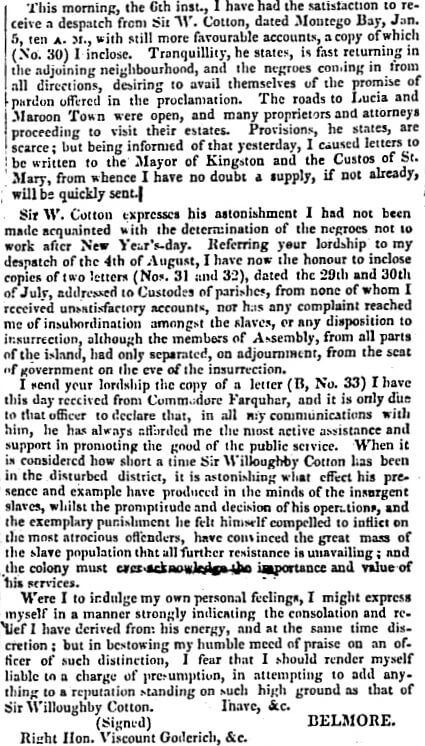
This morning, the 6th inst., I have had the satisfaction to receive a despatch from Sir W. Cotton, dated Montego Bay, Jan. 5, ten A. M., with still more favourable accounts, a copy of which (No. 30) I inclose. Tranquillity, he states, is fast returning in the adjoining neighbourhood, and the negroes coming in from all directions, desiring to avail themselves of the promise of pardon offered in the proclamation. The roads to Lucia and Maroon Town were open, and many proprietors and attorneys proceeding to visit their estates. Provisions, he states, are scarce; but being informed of that yesterday, I caused letters to be written to the Mayor of Kingston and the Custos of St. Mary, from whence I have no doubt a supply, if not already, will be quickly sent.
Sir W. Cotton expresses his astonishment I had not been made acquainted with the determination of the negroes not to work after New Year's-day. Referring your lordship to my despatch of the 4th of August, I have now the honour to inclose copies of two letters (Nos. 31 and 32), dated the 29th and 30th of July, addressed to Custodes of parishes, from none of whom I received unsatisfactory accounts, nor has any complaint reached me of insubordination amongst the slaves, or any disposition to insurrection, although the members of Assembly, from all parts of the island, had only separated, on adjournment, from the seat of government on the eve of the insurrection.
I send your lordship the copy of a letter (B, No. 33) I have this day received from Commodore Farquhar, and it is only due to that officer to declare that, in all my communications with him, he has always afforded me the most active assistance and support in promoting the good of the public service. When it is considered how short a time Sir Willoughby Cotton has been in the disturbed district, it is astonishing what effect his presence and example have produced in the minds of the insurgent slaves, whilst the promptitude and decision of his operations, and the exemplary punishment he felt himself compelled to inflict on the most atrocious offenders, have convinced the great mass of the slave population that all further resistance is unavailing; and the colony must ever acknowledge the importance and value of his services.
Were I to indulge my own personal feelings, I might express myself in a manner strongly indicating the consolation and relief I have derived from his energy, and at the same time discretion; but in bestowing my humble meed of praise on an officer of such distinction, I fear that I should render myself liable to a charge of presumption, in attempting to add any thing to a reputation standing on such high ground as that of Sir Willoughby Cotton. Ihave, &c.
(Signed) BELMORE.
Right Hon. Viscount Goderich, &c.